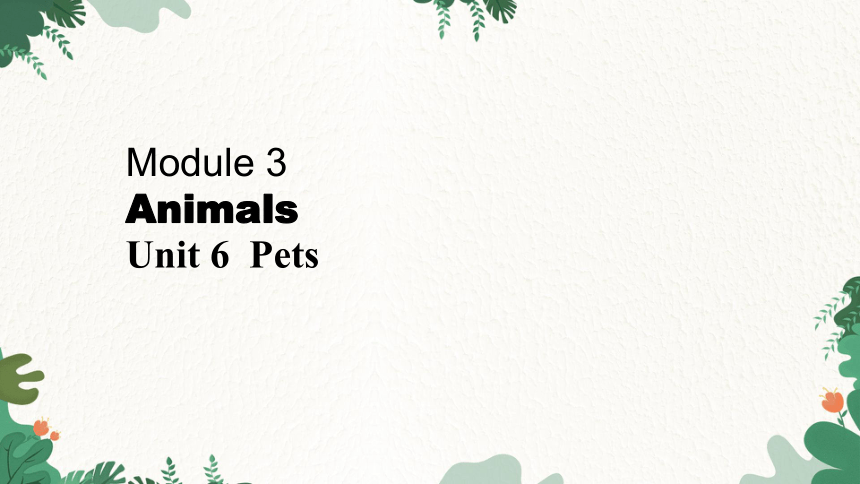(
课件网) Module 3 Animals Unit 6 Pets Period 2 Listening & Grammar Listening Different kinds of pets A Jason is talking with his friend Alice about their favourite pets. Listen to their conversation and complete the notes below. Write one word in each blank. Alice Favourite pet: (1) Reason : They are (2) to hold and to touch. Jason Favourite pet: (3) Reasons: They are (4) to take care of and it is nice to (5) them swim around. cats pleasant fish easy watch B Listen to the recording again. Who has each of the following opinions Put a tick (√) in each correct box. In some cases, Alice and Jason both agree. Opinions Jason Alice 1. Cats just lie around. They do not do anything. 2. Cats just do as they wish. 3. Dogs need a lot of attention. 4. You cannot play with a fish or even hold it. 5. You cannot really do anything with a fish, except watch it. 6. It is nice to watch the fish swim around. Grammar A Using adverbs with verbs We can use adverbs to talk about how something happens or is done. The cat is sleeping peacefully. The girl is talking with her mum happily. Work out the rule We usually put the adverb (after/before) the main verb or the object. Many adverbs are formed by adding -ly to adjectives: Things to remember hard, fast, late These adverbs have the same form as adjectives. He is a hard worker He works hard. She is a fast runner She can run fast. Do you like late dinners No, l do not like to eat late. good, well Good is an adjective; well is an adverb. ls she a good singer Yes, she sings well. A man called Happy keeps a pet shop , but today Happy is not happy! He is speaking to his plete the sentences with the correct form of the words in the box. Use each word only once. bad correct happy quick cheerful good patient My customer are leaving me because you act (1) badly . In the future, I want you all to smile (2) at our customers. I want you all to listen to them (3) , I want you to work (4) and add up all the amounts (5) . Finally, I want you all to dress (6) . Do all these things, and I’m sure we’ll work (7) together. cheerfully quickly correctly well happily patiently 1.Don’t eat so ___(quick/quickly). It’s not good for you. 2. Why are you ___(angry/ angrily) I haven’t done anything. 3. Can you speak ___(slow/ slowly) 4. Bill is a very ___(careful/carefully) driver. 5. Jane is studying ___(hard/ hardly). 6.Those oranges look ___(nice/nicely). Can I have one Exercises B The comparative and superlative of adverbs We have learnt how to compare people or things with adjectives. We can use adverbs to compare how something happens or is done. We can take care of pet dogs more easily in large open spaces than in small spaces. Of all her friends, Emma looked after her pet dog (the) most carefully. We form the comparative and superlative of adverbs like this: Work out the rule To form the comparative and superlative of adverbs ending in –ly, we add _____ and _____ before them. For a ... ...

